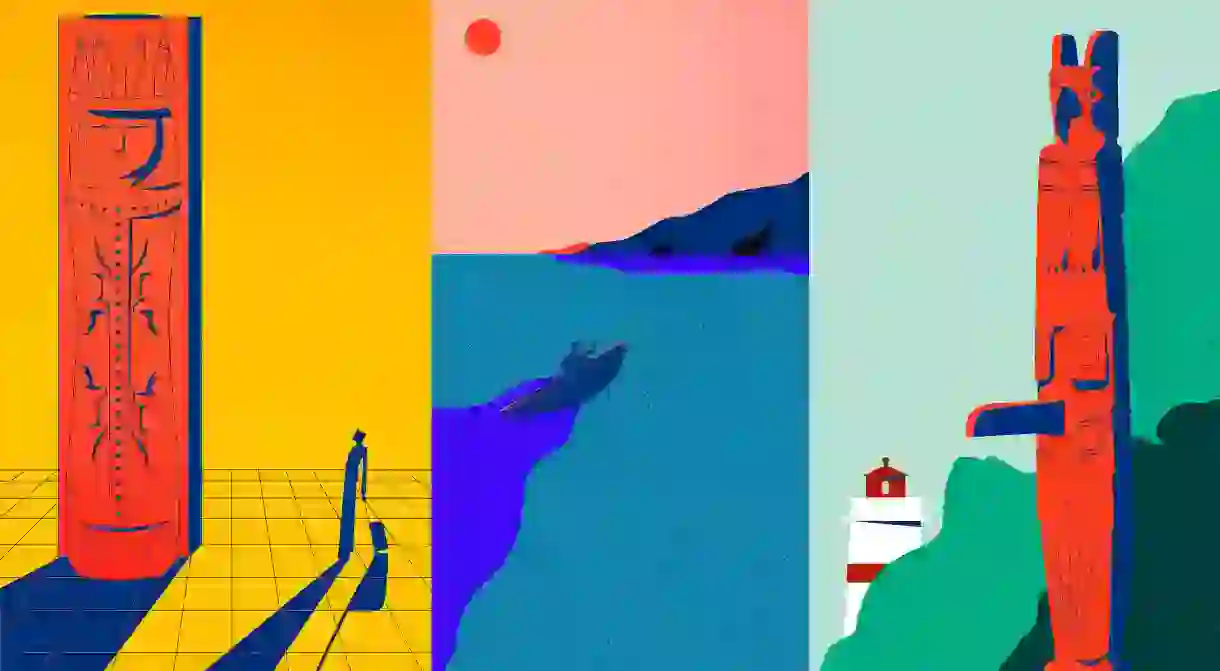Unforgettable First Nations Experiences in Vancouver

Authentic Indigenous experiences are essential to any Vancouver itinerary. Spending time appreciating the art, culture and history of the local First Nations groups is an incredible way to gain a unique appreciation of the city.
There are three First Nations groups with traditional territories in modern-day Vancouver, the Musqueam, Squamish and Tsleil-Waututh – three distinct groups who are part of the larger Coast Salish (pronounced SAY-lish) cultural group. Here are nine unforgettable First Nations experiences in Vancouver.
Did you know – Culture Trip now does bookable, small-group trips? Pick from authentic, immersive Epic Trips, compact and action-packed Mini Trips and sparkling, expansive Sailing Trips.
Unexpected art in the Vancouver Airport (YVR)
From the moment a plane lands in Vancouver, visitors are immersed in First Nations culture. The airport might seem like an unlikely place for award-winning art, but YVR hosts an ever-expanding collection of spectacular pieces that are seen by millions of travelers each year. The most striking features of the terminal-wide exhibition are the carved red cedar Musqueam Welcome Figures, which loom large (17 ft./5m tall) in the Canada Customs Hall. For those that would like to learn more, the airport offers a free Indigenous Art Tour.
Sharing stories in Stanley Park
Stanley Park, along with its urban rainforest and rocky shores, is the ancestral home of the Coast Salish people. The nine totem poles at Brockton Point in the east of the park are one of Vancouver’s most visited sites, according to the Vancouver Parks and Recreation. And although they’re all replicas, a totem added in 2009 was carved by Squamish Nation artist Robert Yelton. First Nations cultural ambassadors often convey the importance of the park and their history by sharing stories and Indigenous practices with visitors. Candace Campo, whose ancestral name is Xets’emits’a (“to always be there”), heads up Talaysay Tours and operates two superb Indigenous guided tours of Stanley Park: Talking Trees and Spoken Treasures.
Bill Reid Gallery of Northwest Coast Art
The small Bill Reid Gallery celebrates the artist who spent a lifetime exploring his Haida roots. Born in 1920 to a Haida mother and a Scottish father, Reid called himself “a maker of things” rather than an artist, but his works empowered First Nations artists to reclaim what had been lost to them by generations of colonization. The gallery displays a permanent collection of jewelry, prints and sculptures by Bill Reid and other contemporary Northwest Coast Indigenous artists, and also hosts curated exhibitions. Admirers of Reid’s work also won’t want to miss his 18-foot-tall (5.5m) bronze killer whale sculpture at the entrance to the Vancouver Aquarium.
Coastal Peoples Fine Arts Gallery
In Vancouver’s historic Gastown, Coastal Peoples Fine Arts Gallery showcases artwork by First Nations artists from British Columbia’s coastal tribes, as well as from the Inuit communities of Canada’s arctic regions. While not Indigenous owned, it’s a stunning and impressive collection of traditional and contemporary handcrafted jewelry, carvings, paintings and textiles. It is a great place to learn more about First Nations culture and mythology. The gallery also hosts solo exhibitions and talks by artists.
Skwachàys Lodge and Art Gallery

Canada’s first Indigenous art hotel is a boutique hotel with a conscience. A stay at Skwachàys Lodge offers an immersive experience to learn about Indigenous artists (each room was decorated in partnership with an Indigenous artist), as well as support the artist-in-residence program This program offers subsidized housing on the top floor to each artist. The ground floor features a First Nations art gallery with prints, carvings, masks and jewelry for sale.
Mr. Bannock Food Truck
Chef-owner Paul Natrall, of the Squamish Nation, launched Vancouver’s first Indigenous food truck in 2018. Named after bannock bread, a First Nations staple traditionally made from corn or flour, the Indigenous fusion menu includes bannock fry bread, tacos, “smokies” (smoked sausages) and signature chicken and waffles. Other traditional Squamish ingredients like juniper berries and salmon make regular appearances as well. Paul spends a lot of time doing catering or special events, but check out streetfoodapp.com to see when and where the Mr. Bannock food truck is open for business. If the truck isn’t out on the streets that day, then book a table at Salmon n’ Bannock Bistro on West Broadway for seasonal First Nations dishes featuring traditional wild ingredients.
Paddling Burrard Inlet and Indian Arm
Spending time with the Tsleil-Waututh Nation (“The People of the Inlet”) is the best way to learn how First Nations have long navigated the waters around modern-day Vancouver. Burrard Inlet is a fjord formed during the last Ice Age, and it separates Vancouver from the North Shore. Tsleil-Waututh Nation-owned Takaya Tours takes visitors out on these protected waters, on 25-foot-long (8m) traditional-style ocean-going canoes. Visitors paddle to Indian Arm, a scenic steep-sided fjord that branches north from Burrard Inlet, while First Nations guides sing songs, share legends and living traditions, and point out ancient village sites where their people thrived for thousands of years.













